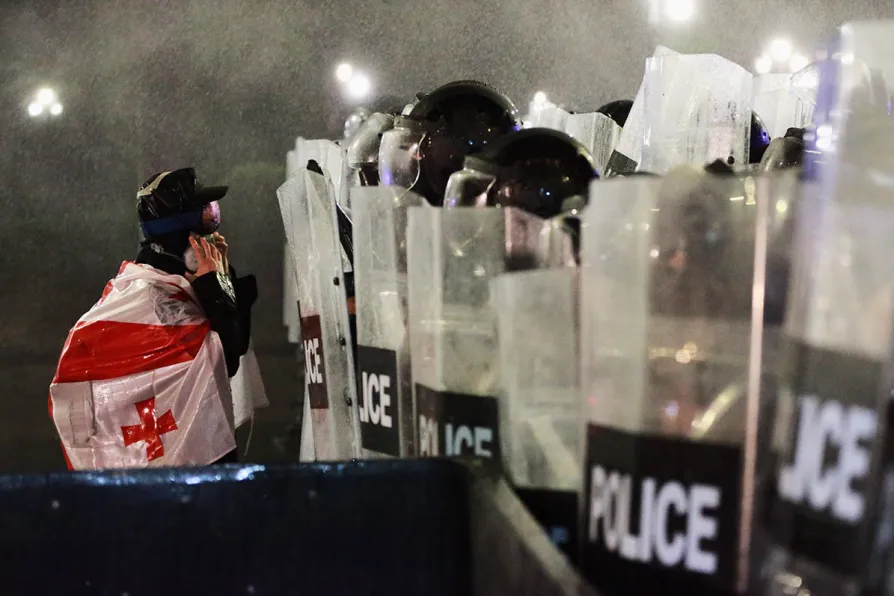
 A protester stands in front of police blocking protesters during an opposition rally in the city center of Tbilisi, Georgia, October 4, 2025, boycotting the municipal elections and call for the release of political opponents
A protester stands in front of police blocking protesters during an opposition rally in the city center of Tbilisi, Georgia, October 4, 2025, boycotting the municipal elections and call for the release of political opponents
PROTESTERS tried to storm Georgia’s presidential palace at the weekend but were repelled by police using water cannon and pepper spray, as the main opposition blocs boycotted local elections.
Tens of thousands of supporters of the pro-Western opposition rallied in the capital Tbilisi in protest against the policies of the governing party, Georgian Dream, which they accuse of trying to pull the country into Russia’s orbit.
They carried national flags and placards supporting membership of the European Union, a goal enshrined in the constitution.
Georgian Dream halted talks on joining the bloc last year, triggering waves of protests that have been met with mass arrests and heavy-handed police action. The negotiations were broken off after the ruling party declared victory in an election that the opposition claimed had been rigged.
The rallies have continued despite the government introducing laws that target demonstrators, human rights groups, non-governmental organisations and independent media. Critics say that some measures have been modelled on legislation passed in Russia, where President Vladimir Putin has stifled dissent.
Organisers of Saturday’s demonstration, including celebrated opera singer Paata Burchuladze, called on protesters to “take power back into the hands of the people,” after the government jailed key opposition figures, attempted to shut down critical media and used mass arrests and steep fines against demonstrators.
Some tried to force entry into the presidential palace in central Tbilisi, smashing the gate before being driven away by riot police.
Police said the rally violated laws regulating public assemblies and protest.
Five activists, including Mr Burchuladze, were detained afterwards. According to the Interior Ministry, they were accused of calling for the violent overthrow of the government and “organising, leading and participating in group violence.”
The opposition had promised a “peaceful revolution” before Saturday’s elections.
Georgian Dream claimed victory in the opposition-boycotted voting, which was held to elect the mayors of five major cities, including Tbilisi, the heads of over 50 other municipal administrations and local councillors.
More than 50 international and local groups were registered to observe the municipal vote, but there were no delegations from the European Parliament, the Organisation for Security and Co-operation in Europe and other Western groups that monitored the last local elections in 2021.
Key Georgian NGOs also chose not to deploy missions, citing Georgian Dream’s recent repressive laws and a broader deterioration in the political and legal environment.










